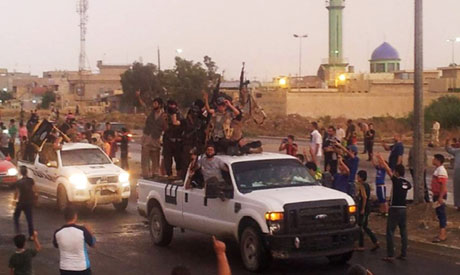
In this photo taken Wednesday, June 25, 2014, fighters of the al-Qaida-inspired Islamic State of Iraq and the Levant (ISIL) parade in the northern city of Mosul, Iraq. (Photo:AP)
As the Islamic State in Iraq and the Levant (ISIL) continues to seize more towns near Mosul, Human Rights Watch (HRW) interviews villagers of Guba and Shireekhan regarding the kidnappings of Shia Turkmen and the destruction of places of worship in these villages.
In a report released by the New York-based rights group Saturday, HRW said that forces of ISIL kidnapped at least 40 Shia Turkmen, bombed four Shia shrines, and raided homes and farms in two Shia villages bordering the Iraqi city of Mosul.
ISIL had ordered all 950 Shia Turkmen families to leave the villages of Guba and Shireekhan, which ISIL remains in control of.
The displaced residents told HRW that the Sunni insurgents killed at least some of the kidnapped men, but none had seen bodies or could provide other confirmation.
“This ISIS rampage is part of a long pattern of attacks by armed Sunni extremists on Turkmen and other minorities,” said Letta Tayler, senior terrorism and counterterrorism researcher at HRW. “The killing, bombing and pillaging threatens to displace entire communities, possibly forever,” she added.
Guba and Shireekhan are only five kilometers north of Mosul, which was captured 10 June.
ISIL considers Shias to be heretics and has frequently executed Iraqi and Syrian Shias on that basis.
AFP reported 23 June that 23 detainees were killed during a militant attack on an Iraqi convoy transporting them south of Baghdad.
Iraq has been witnessing a new wave of violence fueled by ISIL. The militants have been operating in the Iraqi provinces of Nineveh, Diyala, Salah Ad-Din and Anbar.
Iraqi Prime Minister Nouri Al-Maliki has said that the country’s security forces would confront the terrorists, calling the seizure of Mosul a “conspiracy.” Al-Maliki has blamed Saudi Arabia and Qatar for the security crisis and growing terrorism in his country, denouncing Riyadh as a major supporter of global terrorism.
Four men who fled the night of 24 June, two from each village, said they saw about 70 military vehicles filled with armed ISIL members roll into Guba and Shireekhan on the afternoon of 23 June.
Haider, a 40-year-old Guba farmer, who was watching the fighters from a bluff overlooking his village, said: "They used loudspeakers to say bad things about Shia and told us, 'All of you have to leave.' Then they rounded up the men and boys and checked their identity cards."
The nine villagers said that ISIL had taken about 60 Shia men, all Turkmen. HRW says that an international organisation received reports that 20 of the captives were released, after determining that they were Sunni.
All others interviewed said they had heard from Sunni inhabitants of the villages, or relatives who had not yet fled, that ISIL had destroyed Shia shrines. At that point any remaining Shia in the villages fled, they said.
On 25 June, the armed militants went door-to-door through Shia Turkmen homes, searching for remaining men and looting, residents told HRW, citing Sunni inhabitants of the two villages.
In Tel Afar, ISIL on 25 June destroyed the Shia shrines of Imam Saad and Khider Al-Elias, a historic shrine on a site where Christians and Yezidis, a Kurdish minority sect, also worshipped, as well as the Hashim Antr Mosque, witnesses said. The following day, ISIL destroyed four more mosques in Tel Afar — Imam Sadiq, Al-Abbas, Ar Mahmoud, and Ahl Al-Beit — they said.
On 23 June, AFP reported that the strategic Shia-majority northern Iraq town of Tel Afar and its airport were in the hands of Sunni Arab militants after days of heavy fighting.
“ISIL should immediately free all captured civilians and stop its marauding. Killing civilians or captured combatants amounts to a war crime, and the ISIL fighters and commanders should be aware they will face justice for their crimes,” Tayler said.
Short link: